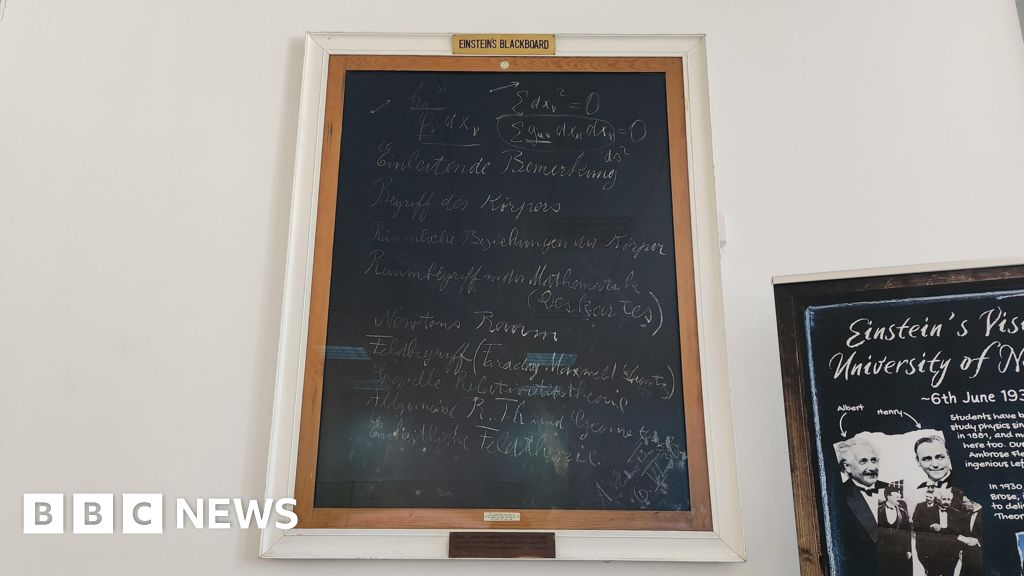Science
Nottingham University Plans to Showcase Einstein’s Historic Blackboard

Academics at the University of Nottingham are seeking to prominently exhibit a historic blackboard used by Nobel Laureate Albert Einstein during a guest lecture on June 6, 1930. This blackboard, believed to be the only one in the world bearing Einstein’s signature, has spent decades tucked away in a staff meeting room.
Dr. Emma Chapman, the university’s outreach coordinator for physics and astronomy, has taken on the project of sharing this unique artefact with a wider audience. “I don’t think people have quite understood how rare the blackboard is until very recently,” she stated, emphasizing its priceless nature. She expressed a desire to relocate it to a more visible location, ensuring that both students and visitors can appreciate its significance.
Einstein’s visit to Nottingham was orchestrated by Prof. Henry Brose, who led the physics department from 1927 to 1936. Brose, a friend of Einstein’s, had translated several of his works from German to English and was instrumental in promoting his theories in the UK. After several attempts, Einstein finally agreed to visit Nottingham, having also been invited to speak at Oxford University. During his stay, he was hosted by Prof. Frank Granger, the university’s vice-principal, and indicated in a letter that he would arrive “completely alone.”
The lecture itself was notable for several reasons, including Einstein’s detour to Woolsthorpe, Lincolnshire, to visit the childhood home of Sir Isaac Newton. While delivering his lecture in German, Einstein wrote various notes and theories on the blackboard, which were subsequently translated into English by Prof. Brose. A 1930 article in the Journal of the Royal Society of Arts described Einstein’s delivery as possessing a “curious childlike, timid expression,” conveying an impression of greatness without a “commanding voice.”
The blackboard is not the only historical artefact from Einstein’s visit. He also signed a 1713 first edition of Newton’s influential work, Philosophiæ Naturalis Principia Mathematica, which belonged to Prof. Granger. Interestingly, the chalk Einstein used during his lecture went missing when a student took it. The student kept one half, while the other half was given to a journalist from the Nottingham Journal, who later returned it to the university on the 50th anniversary of Einstein’s lecture.
The university has been collecting various materials related to Einstein’s visit, including newspaper clippings and handwritten letters. As discussions continue about the best way to display the blackboard, options include placing it in the foyer of the physics building or in a classroom where students can engage with it. Despite being housed behind glass, the chalk marks have faded over time, prompting Dr. Chapman to state the importance of an expert appraisal to ensure its protection before any relocation.
“We certainly don’t want to move it until someone has looked at it and said ‘yes, that’s good’,” Dr. Chapman added. “If we could put it in a Perspex box to guarantee it for the next century, that would be absolutely fabulous.” The university is committed to preserving this piece of history, which has been with them for 95 years, and aims to keep it for another 95 years to come.
-

 Health3 months ago
Health3 months agoNeurologist Warns Excessive Use of Supplements Can Harm Brain
-

 Health3 months ago
Health3 months agoFiona Phillips’ Husband Shares Heartfelt Update on Her Alzheimer’s Journey
-

 Science2 months ago
Science2 months agoBrian Cox Addresses Claims of Alien Probe in 3I/ATLAS Discovery
-

 Science2 months ago
Science2 months agoNASA Investigates Unusual Comet 3I/ATLAS; New Findings Emerge
-

 Science1 month ago
Science1 month agoScientists Examine 3I/ATLAS: Alien Artifact or Cosmic Oddity?
-

 Entertainment5 months ago
Entertainment5 months agoKerry Katona Discusses Future Baby Plans and Brian McFadden’s Wedding
-

 Science1 month ago
Science1 month agoNASA Investigates Speedy Object 3I/ATLAS, Sparking Speculation
-

 Entertainment4 months ago
Entertainment4 months agoEmmerdale Faces Tension as Dylan and April’s Lives Hang in the Balance
-

 World3 months ago
World3 months agoCole Palmer’s Cryptic Message to Kobbie Mainoo Following Loan Talks
-

 Science1 month ago
Science1 month agoNASA Scientists Explore Origins of 3I/ATLAS, a Fast-Moving Visitor
-

 Entertainment2 months ago
Entertainment2 months agoLewis Cope Addresses Accusations of Dance Training Advantage
-

 Entertainment3 months ago
Entertainment3 months agoMajor Cast Changes at Coronation Street: Exits and Returns in 2025









